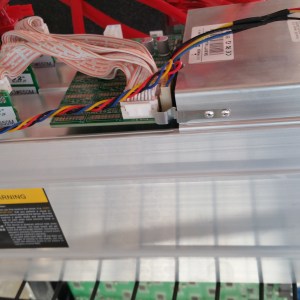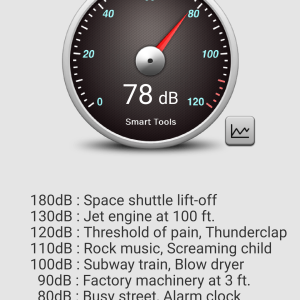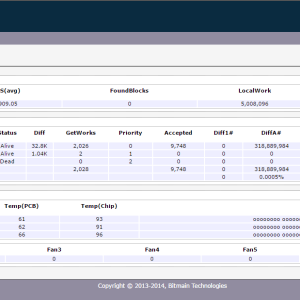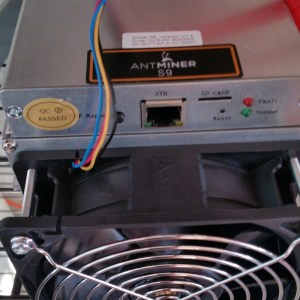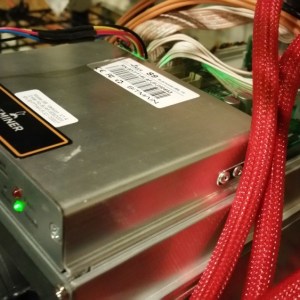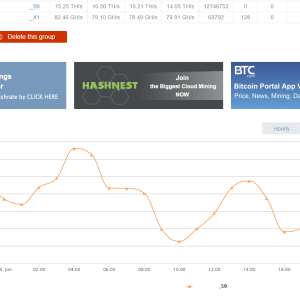
Bitmain has long led the industry not only in ASIC development but also in making sure they are available to more than just a few big customers. The other hallmark of Bitmain is they announce a new miner only when they are nearly ready to ship. No pre-ordering and long waits. The AntMiner S9 is no exception. Bitmain had recently announced that they would soon be releasing and shipping the first 16nm ASIC to market and followed up by quickly opening ordering and selling out fast of batch one and batch two S9s. The S9 has very aggressive specs compared to the S7 which as the time was top dog. The 16nm BM 1387 ASIC is rated for 0.098 J/GH which allows the S9 to push 14 th/s at roughly 1380 watts at the wall. Lets go over the full specifications of the S9.
Disclosure: S9 was provided to review by Bitmain.
Also Read: Review of the Baikal 150 mh/s X11 DASH ASIC Miner
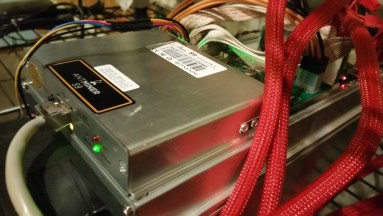 Specifications:
Specifications:
Hash Rate: 14.0TH/s ±5%
Power Consumption: 1375W + 7% (at the wall, with APW3 ,93% efficiency, 25C ambient temp)
Power Efficiency: 0.098 J/GH + 7%(at the wall, with APW3 93% efficiency, 25°C ambient temp)
Rated Voltage: 11.60 ~13.00V
Chips per unit: 189x BM1387
Dimensions: 350mm(L)*135mm(W)*158mm(H)
Cooling: 2x 12038 fan
Network Connection: Ethernet
Default Frequency: 650M
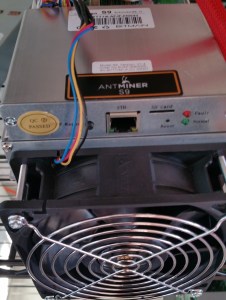 As you can see they are very aggressive specs. The shipping gods were benevolent and the S9 showed up in perfect shape securely packed as usual. The first thing you notice when you get it out of the box is the heft. With all the heatsinks attached on both sides of the hashing board for cooling. With the power draw of nearly 1400 watts you need to have a PSU that can handle this or use two PSUs. Also make sure your wiring can handle it. The AntPSU is rated at 1600 watts and runs exclusively on 220v. While this is the PSU we run the S9 on for the sake of the review we will show the way to setup and run with 2 PSUs. We connected an EVGA Supernova 1300 watt and a 1200 Watt custom Spondoolies PSU to the S9. If using two PSUs it is a must that they be connected in the proper way. One PSU you connect to two hashing boards. All three power connections must have their own cable. The second PSU you connect to the last board and one more PCIe cable to the control board. For powering on you first start the PSU with the two boards then power up the last board and controller. This way the controller will find all three boards.
As you can see they are very aggressive specs. The shipping gods were benevolent and the S9 showed up in perfect shape securely packed as usual. The first thing you notice when you get it out of the box is the heft. With all the heatsinks attached on both sides of the hashing board for cooling. With the power draw of nearly 1400 watts you need to have a PSU that can handle this or use two PSUs. Also make sure your wiring can handle it. The AntPSU is rated at 1600 watts and runs exclusively on 220v. While this is the PSU we run the S9 on for the sake of the review we will show the way to setup and run with 2 PSUs. We connected an EVGA Supernova 1300 watt and a 1200 Watt custom Spondoolies PSU to the S9. If using two PSUs it is a must that they be connected in the proper way. One PSU you connect to two hashing boards. All three power connections must have their own cable. The second PSU you connect to the last board and one more PCIe cable to the control board. For powering on you first start the PSU with the two boards then power up the last board and controller. This way the controller will find all three boards.
Bitmain AntMiner S9 Simple Setup, Top Performance
Once you have powered up the S9 will be found on your network as they ship with DHCP enabled. This allows for fast and simple setup. For this review we used AntPool and Kano.is for mining pools. The controller is very robust with it supporting many boards as well as extra fans, the front of the unit also has a micro-sd card slot for easy updating and recovering of the controller. When you get to the main panel as always you will see the familiar Bitmain control screen. The user name and PW is root/root, first off you want to change the PW to one of your choosing.
“The Antminer S9 is not only the world’s first miner based on a 16nm technology but also a demonstration of Bitmain’s dedication to continue supporting the global bitcoin ecosystem and of Bitmain’s technological prowess as a world-class manufacturer of cutting-edge Application-specific integrated circuit (ASIC) chips” Bitmain Spokesman
 The miner status screen gives you all your information at a glance. One thing to keep and eye on is the temp. The S9 runs hotter than the previous S7 at roughly 80c to 90c depending on your ambient temps. Pool connection is simple and fast. The S9 comes up to speed poolside quickly as well. One thing you will notice that is the fan whine is pervasive. The S9 will not be a miner for your den or living room. We will work with several different fans to see if we can find a solution that moves the same amount of cfm yet is not as loud in the near future. The Antminer S9 puts out about 79 dbs at 4 feet. One of the reasons for the robust cooling though is that the S9 is meant to run much much longer than previous gen equipment. With a longer life cycle of mining equipment happening now a powerful robust system that can work 24/7 for very long time.
The miner status screen gives you all your information at a glance. One thing to keep and eye on is the temp. The S9 runs hotter than the previous S7 at roughly 80c to 90c depending on your ambient temps. Pool connection is simple and fast. The S9 comes up to speed poolside quickly as well. One thing you will notice that is the fan whine is pervasive. The S9 will not be a miner for your den or living room. We will work with several different fans to see if we can find a solution that moves the same amount of cfm yet is not as loud in the near future. The Antminer S9 puts out about 79 dbs at 4 feet. One of the reasons for the robust cooling though is that the S9 is meant to run much much longer than previous gen equipment. With a longer life cycle of mining equipment happening now a powerful robust system that can work 24/7 for very long time.
“Bitmain has built a remarkable engineering team that combines experience from various tech giants and startups. It has come a long way from being a bitcoin hardware startup and has capabilities at par with, if not more than, any competent manufacturer in the global ASIC space.” Bitmain Spokesman

Poolside the miner is running at 13.9 th/s to 14.6 th/s while pulling 1380 watts at the wall. Using 220v with the AntPSU the miner pulled 1340 watts and ran at 14.6 th/s to 14.8 th/s stable. The AntMiner S9 is a very well built Bitcoin ASIC miner that definitely steps up the game with its power to gh/s ratio. Adding in the care to detail will allow it to run a long time. The AntMiner S9 running on the 16nm ASIC is a first to market next gen chip. With Bitcoin value moving up many miners even current gen like the AntMiner S7 and theh Avalon 6 will remain profitable well into the future and the next gen miners like the S9 will go be for far longer as well. At around $2100 at press time the S9 is a good miner to get at a good price. It is the only 16nm or smaller ASIC shipping right now as well. BitFury, BW Pool, Innosillicon and others will follow suit soon but they are not here yet. Bitmain’s excellent support backs up every miner. There is also Bitmain Warranty who can repair the S9 and even S7 outside of China which cuts down on shipping costs and time if there is an issue with your miner.
In the coming days we will also publish a video walk-through on how to setup and run your AntMiner S9. Stay tuned.
What are your thoughts on the Bitmain AntMiner S9?
Image Source: Bitcoinist.net, Bitmain




